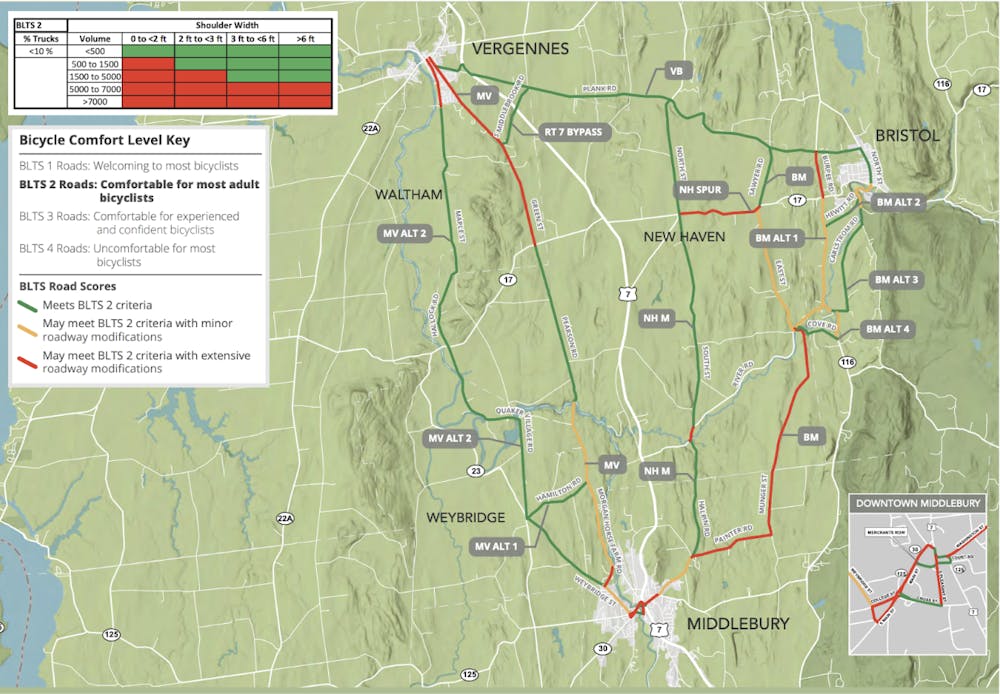The Triangle Bike Loop Project, an initiative to create a signed, well-maintained bike loop connecting the towns of Middlebury, Bristol and Vergennes, recently secured a $30,000 grant to conduct a new scoping study of possible routes.
Planning for the project began in 2018 for an assignment in Middlebury students Connor Pisano ’18, Hunter Cole ’18.5 and Maria Celestina Abragan ’18.5’s Environmental Studies senior seminar. During their class, Pisano, Cole and Abragan gathered survey data on infrastructure weaknesses and social conflicts, used GIS techniques and sat with focus groups of both cyclists and motorists.
According to the project’s master plan, 6.6% of Vermonters walk or bike to work, the fourth-highest rate in the nation. Improved infrastructure could increase those rates.
The Addison County Regional Planning Commision is leading and coordinating the project. The planning commission contracted SE Group, a planning and landscape architecture firm based in Burlington, and South Burlington-based consulting firm Stantec, to conduct the majority of the research and planning.
SE group also created a project website to inform members of the public on the project and its progress.
In addition to the planning commission, the project is led in part by the Walk and Bike Council of Addison County, which is a group of residents that advises county and town governments on improving walking and biking in the community. According to their website, the council believes that improved infrastructure would enhance access to amenities and services, while creating healthier lifestyles, a better sense of place and a cleaner environment.
The project is also supported by the Bristol Trail Network, Middlebury and Vergennes’ planning commissions, Addison County Transit Resources and the Vermont Department of Health.
In 2018, the Vermont Department of Housing and Community Development awarded an initial $35,000 grant to the towns of New Haven and Vergennes jointly to begin planning the roughly 32-mile route through multiple roads.
One potential benefit of the loop is more economic activity in town centers and along the roads themselves, as riders pass by shops and other points of interest. Additionally, the route could make Addison County a more appealing place to live for millennials, a generation of which 26% do not have a driver’s license and 46% say they are actively trying to reduce their transportation environmental impacts, according to the project’s master plan.
While the projects are different in scope, the Triangle Bike Loop Project may look at examples such as the Lake Champlain Valley Bikeway for inspiration.
A master plan for the bike route was released in June 2020, identifying funding sources, potential routes and the improvements needed to those roads to create a satisfactory bike loop. Routes were selected to match what the master plan classified as the Bicycle Level of Traffic Stress 2, which is comfortable for most adult cyclists. Survey data was also collected from county residents on preferred routes, based on countless hours of lived experiences.
Much of the identified routes already meet the Bicycle Level of Traffic Stress 2 standard, with the most common improvement needed for other roads being shoulder widening.
Other potential improvements to the roads along the route include increased road markings; speed-activated signs, which have been shown to reduce driver speeds; and optical speed bars, which make drivers perceive their speed as faster than it truly is. The groups collaborating on the project also plan to create a logo and route-specific signage for the roads.
The completion of road improvements will require a mix of municipal, state and, potentially, federal funding as well as a bid process to determine contractors. The project does not currently have a set start or end date, as more studies must be completed and funding determined prior to beginning construction.
Ben Wagner (he/him) is a Local Editor.
Wagner has previously served as an SGA Writer and Staff Writer. He is an IGS-Global Environmental Change major, and is minoring in Religion. When not up to other shenanigans, Ben loves playing outside and riding his bike.




